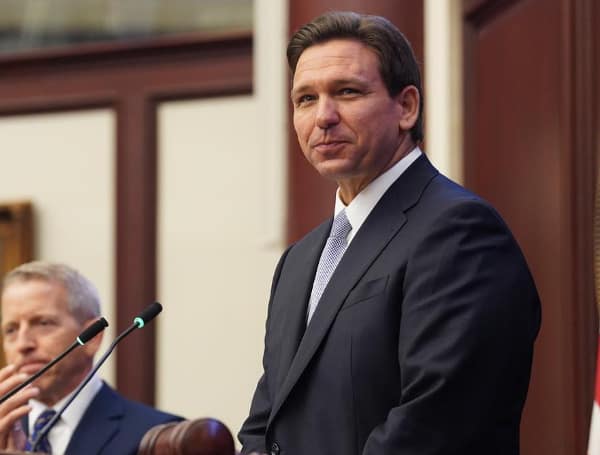Today, Governor Ron DeSantis signed into law his third consecutive anti-crime, pro-public safety legislative package.
The bills enacted by the Governor strengthen pre-trial detention and push back against “bail reform” efforts that have made other states significantly less safe, increase sentences for drug traffickers that target children, and subject child rapists to the death penalty.
Last month, Governor DeSantis signed legislation that reforms Florida’s death penalty statutes to ensure justice in capital cases.
In the news: U.S. Supreme Court Asked To Halt Execution Of Florida Man Who Stabbed Woman 37 Times
“Florida is a law-and-order state with a 50-year record low crime rate and double-digit year-over-year decreases in murder, burglary, and overall crime,” said Governor Ron DeSantis. “For three consecutive legislative sessions we have enacted tough-on-crime policies, and this year we are continuing to implement measures to protect our communities and keep Florida safe, with a particular emphasis on keeping criminals in jail and throwing the book at pedophiles.”
According to the governor’s office, Floridians are protected from “bail reforms” being pushed by politicians and prosecutors in high-crime jurisdictions throughout the country by the governor signing HB 1627, legislation which:
- Requires the Florida Supreme Court to develop a uniform statewide bond schedule by the end of the year;
- Prohibits the chief judge of a judicial circuit from setting a lower bond amount for a criminal offense than the uniform statewide bond schedule;
- Authorizes the chief judge of a judicial circuit to set a higher bond amount for a criminal offense than the uniform statewide bond schedule;
- Prohibits a person from being released prior to his or her first appearance if he or she has been arrested for a particularly violent or heinous crime;
- Authorizes a court to revoke pretrial release and order pretrial detention if a defendant violates a condition of pretrial release;
- Adds manslaughter while driving and boating under the influence, trafficking fentanyl, extortion, and written threats to kill to the list of “dangerous crimes”;
- Prohibits a court from granting nonmonetary pretrial release at a first appearance hearing if a defendant is arrested for a dangerous crime and the court determines there is probable cause to believe the defendant committed the offense;
- Requires a state attorney, or a court on its own motion, to motion for pretrial detention if a defendant is arrested for a dangerous crime that is a capital felony, a life felony, or a first-degree felony and the court determines there is probable cause to believe that the defendant committed the offense;
- Requires a court to order pretrial detention of a defendant who is arrested for a dangerous crime if the court finds a substantial probability that the defendant committed the offense and that no conditions of release or bail will reasonably protect the community from risk of physical harm; and
- Authorizes any party to motion for reconsideration of pretrial detention if an alleged criminal is granted pretrial release and then new information comes to light suggesting pretrial detention is warranted.
In the news: Pinellas Deputies Issue Purple Alert For Missing Largo Man
HB 1359 also imposes additional penalties on fentanyl and other drug-related crimes when the drug looks like a piece of candy that targets children, specifically by:
- Making those who traffic such substances eligible for a life sentence and imposing a minimum 25 year sentence and a $1 million penalty; and
- Making it a first-degree felony to possess, sell, or manufacture fentanyl and other controlled substances that resemble candy.
Android Users, Click To Download The Free Press App And Never Miss A Story. Follow Us On Facebook and Twitter. Signup for our free newsletter.
We can’t do this without your help; visit our GiveSendGo page and donate any dollar amount; every penny helps.

